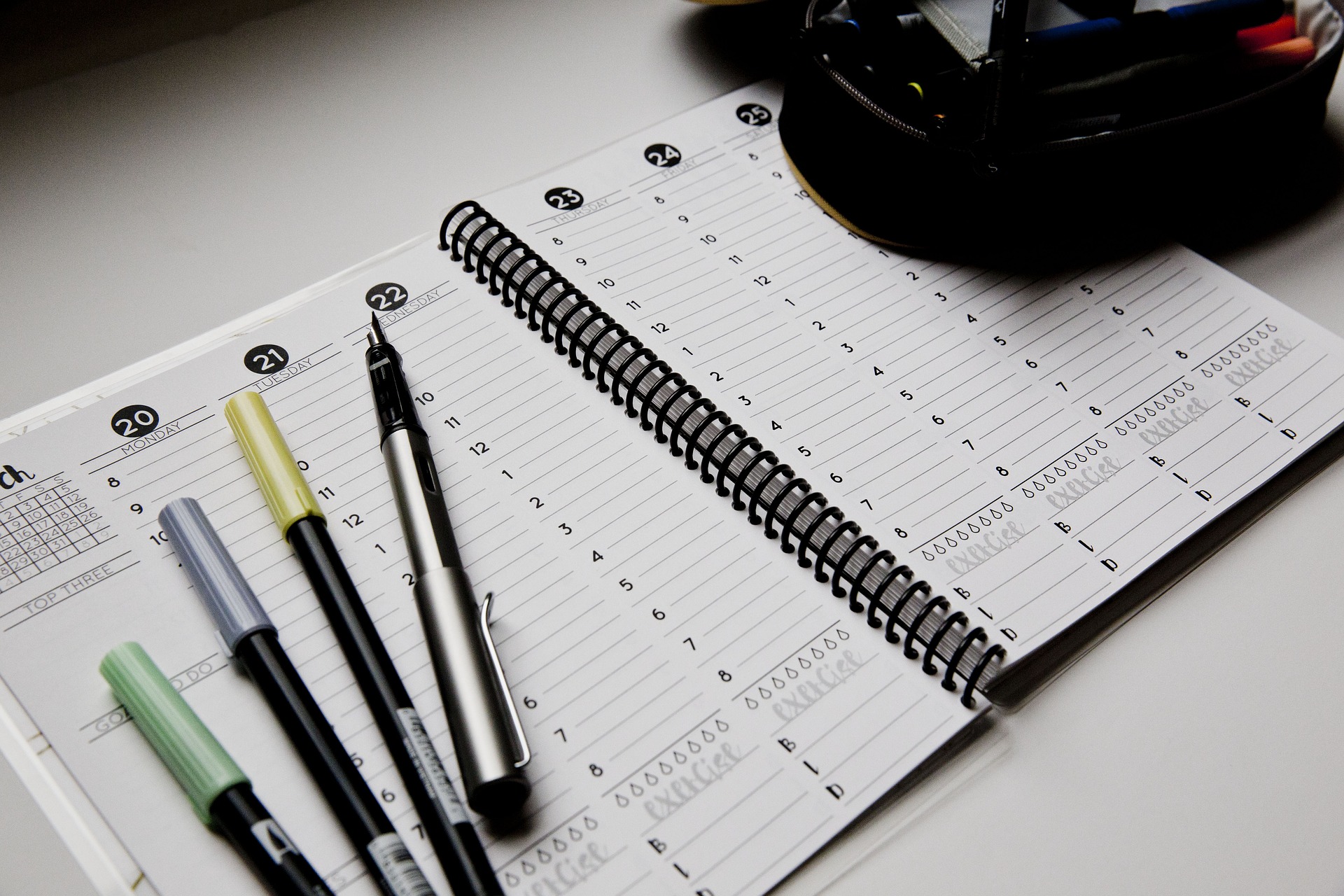Do you ever feel like your life is a mess? That you have no direction from day to day? It’s not fun being devoid of purpose and struggling to reach your goals. When you learn how to plan your day, however, this all changes and so will your whole life.
If you want to plan your day efficiently, follow these steps:
- Set aside a regular time the night before to do it.
- Make a spreadsheet to write out a daily planning routine.
- Keep a note on your phone to write your hourly plans.
- Plan weekly, quarterly, and yearly to unlock the power of purpose.
Let’s dive into each of these in more detail and see how it works in practice!
1. Plan Your Day the Night Before
“The most efficient way to live reasonably is every morning to make a plan of one’s day and every night to examine the results obtained.”
– Alexis Carrel
The first step to getting into a routine of planning your day is setting aside time for it. Whenever I’m starting something new I always like to block out the time even if I don’t exactly know what I’m doing.
This gives me time not just to do it but to figure out how to do it right.
One of the biggest roadblocks when you begin anything is knowing how to do it correctly. You get afraid that you’ll do something wrong, which keeps you from starting in the first place.
If you instead go in with the mindset of “I’m going to block out this time and the first week I’ll spend it experimenting with what works best,” you set yourself up for success.
That’s because a willingness to experiment means that you’re willing to be okay if you don’t do it right. This destroys the perfectionism that keeps most people from changing their lives. And it’s what will set you apart.
But why at night?
Let’s start with the alternative of planning your day in the morning. Doing it this way means you spend the first hour of your day on an administrative task instead of something that really inspires you.
Those high energy levels that you usually wake up with go to waste on something that you can just as easily do when you don’t have as much energy.
Nighttime is important because it lets you account for the day that’s just ended before going into the next one. You’ll be excited about wins from the day, or be prepared with any to-do items or appointments before they even happen.
2. Make a Routine for Nightly Planning in a Spreadsheet
Now that you’ve got the time blocked out in your schedule you need to plan what you’ll do with it. The easiest way is to set up a pattern that you can follow consistently.
Don’t try to perfect it at first, you won’t get data about what works best until after you begin. Just start by writing out a list of questions you want to ask yourself. These should help you review the previous day’s efforts and make plans for the following day.
If you have a weekly review, pull the questions from that but adapt them appropriately. You will mix some of these with to-do items as part of your planning checklist, like this:
- What went well today? Account for the day in your spreadsheet.
- Which goals could I have done better on?
- What’s one thing I will do to make sure that tomorrow is better?
- Check your calendar for any to-do items or appointments that you’ll need to include in your daily plan.
- What do you need to do to prepare for each task on your to-do list? An example of this one would be if I wanted to write a blog post, I’d need to open up the Google Doc for it on my computer.
- Write your daily plan in the note on your phone.
- Visualize yourself executing everything in your daily plan as if it happened perfectly.
It’s easiest to put this all into a spreadsheet because you can reference it regularly. I have mine bookmarked and pinned in Google Chrome at all times so I can reference it throughout the day as I used it to track my goals.
3. Create a Note on Your Phone and Write Out Your Hourly Plans in It
“By failing to prepare, you are preparing to fail.”
– Benjamin Franklin
A spreadsheet is nice for checklists and tracking goals, but it’s not great for daily plans. Instead, when you put your daily plan on your phone, you can easily reference it throughout the day.
I use the ColorNote app for Android but you can use anything.
To set up your daily schedule, make a place for each hour, like this:
6-
7-
8-
…and so on
You’ll leave those in the note and then change what you’re doing each hour of the day. I also make a break and then add a tab in for lunch, dinner, and any relaxation activities, like this:
5-
Dinner
Play with the kids in the yard
9- Nightly planning session
Make sure that you use verbs as you write your plans. Saying that you’ll just work on a task or project isn’t as powerful as writing something like “write a book summary” or “draft a product pitch email.”
The more specific you are, the better, but you can go too far with it. As a rule of thumb, shorten something if it goes beyond one line. Otherwise, you end up with a mass of text that’s really difficult to decipher when it comes time to execute.
Having everything written out like this makes it easy to envision the perfect day. You can also modify it as the day changes.
As a bonus tip here for daily planning, don’t be afraid to plan hourly when setbacks happen, as they always do. I did this just the other day when something unexpected derailed my plans and it salvaged the entire day!
4. Plan Weekly, Quarterly, and Yearly
Setting goals and changing your life seems straightforward in your head, but when you actually the actual process can get confusing. That’s because sometimes you set goals that are plans and plans that are goals.
But when you think deeply about your long-term vision and desired identity shift and combine those with your daily action steps and weekly outcomes, you unleash the power of purpose.
Weekly, quarterly, and yearly planning are vital if you want to succeed in changing your life because they help you create that vision.
You know that you want to become better, but unless you set aside time to plan out what that looks like and how you’ll do it, you’ll never make it happen.
Consider how you’d feel if you had clarity on everything you wanted in life and how to get it. You’d be unstoppable and quickly reach your full potential and finally begin living the life of your dreams.
For some tips on weekly planning, check out my article on how to have a weekly review. Quarterly planning is very similar but drawn out over the course of an entire week. And to learn how to set yearly goals, click here.
Regardless of the exact steps, you always want to answer the following questions or review your answers from previous planning sessions:
- Who do I want to become?
- What is my long-term vision for what my life looks like?
- What do I need to accomplish by the end of the next quarter or year to get myself closer to that vision and identity?
- Which daily steps do I need to take to make sure that I get to where I want to be by the end of the next quarter or year?
Daily planning isn’t completely useless without these, but it’s a whole lot more boring when you don’t have a purpose and vision for what you can accomplish over time with those small daily steps.
Plan Your Day, Change Your Life
Let’s face it, life is messy. It’s easy to get caught up in to-do’s, meetings, and everything else and just go with the flow. When you do that, however, you end up at the bottom of a river, and that’s no fun.
You want to be on the top of the mountain, reaching your wildest dreams and living life to the fullest.
Be honest with yourself and you’ll realize that this vision isn’t possible without preparation and planning. It takes hard work applied consistently over a long period of time to become successful.
None of that is possible unless you plan regularly. Daily planning is an important building block to the much bigger picture of crafting an intentional life that lights you up inside.
It might not always be a ton of fun, but when you plan the night before, use a spreadsheet, make a note of your hourly plans on your phone, and unleash the power of purpose by doing weekly, quarterly, and yearly planning, it can become second nature so you do the little things that lead to big changes life almost on autopilot.
I’ve been doing daily planning consistently for over a decade now and it’s been one of the most important factors leading to the success I enjoy today. It’s helped me run a marathon, start a company, and accomplish many other things I never even dreamed of before.
I’m confident that you can utilize the power of daily planning and reach your own success as well!





